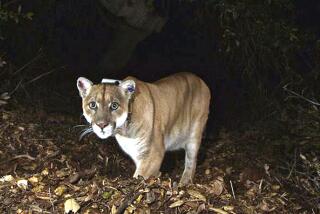Nevada coyote-killing contest raises activists’ fur
- Share via
The rules to the contest were pretty simple: Kill a coyote; win a prize.
A coyote-hunting competition in Nevada over the weekend in which participants killed about 10 of the predators has ruffled the fur of animal-welfare activists, who are rallying to stop future hunts.
Critics say the contest was cruel, excessive and targeted a creature that plays a vital role in the North American ecosystem.
“Coyotes in Nevada and generally in the West are unprotected animals; that means they’re not afforded any government status,” said Don Molde, a member of Nevadans for Responsible Wildlife Management. “To have a bunch of self-described rednecks go out and randomly kill a bunch for fun is just offensive.”
But Jason Schroeder, a Reno-area heavy-equipment mechanic who sponsored the Nevada contest, said the event rid the area of bothersome predators and taught young people about gun safety.
“So many people here hunt,” Schroeder said. “They hunt coyotes. They keep those packs down.”
Still, Nevada animal-rights activists are seeking to follow the lead of California, which this year became the first state nationwide to ban contests that reward the killing of predators such as coyotes, foxes or bobcats. The California Fish and Game Commission acted after the hunts became popular in ranch and farm communities in many Western states.
“Awarding prizes for wildlife-killing contests is both unethical and inconsistent with our current understanding of natural systems,” commission President Michael Sutton told reporters when the California ban was passed Dec. 3. “Such contests are an anachronism and have no place in modern wildlife management.”
Camilla Fox, executive director of the San Francisco Bay Area nonprofit Project Coyote, which pushed for the California ban, said that legal predator-hunting contests and U.S. government-sponsored kills lead to more than a half-million coyotes deaths each year.
“The coyote has become the most misunderstood and maligned carnivore in North America,” she said, and such public-enemy status is unwarranted.
“Coyotes are a native species. They play an invaluable role we should respect and appreciate,” Fox added. “They help keep rodent populations in check. The average coyote consumes 1,800 rodents a year, research shows.”
Fox and other animal-welfare activists say that killing coyotes indiscriminately upsets the ecosystem, allowing such sub-predators as feral cats and raccoons to flourish -- taking a toll on the abundance and diversity of bird species.
Project Coyote’s home page features a picture of a coyote in a winter setting, with a slogan that reads: “Peaceful coexistence.” An article on the site is headlined: “What Kind of Jerk Kills Coyotes for Fun?”
Molde says the killings also upset the social structure of coyote families. If the alpha male and female are killed, younger family members proliferate. Those animals do not have the survival skills to avoid seeking out domesticated farm and ranch animals.
The Nevada Department of Wildlife said Monday that the agency has no plans to follow California’s band on predator-killing contests.
“Coyotes are ubiquitous here,” said agency spokeswoman Teresa Moiola. “Nevada has a lot of rural areas and we see these killing contests and landowners measures to weed out coyotes as a predatory control issue. Also, there is a small number of animals being taken off the landscape.”
The Nevada weekend competition, dubbed the Coyote Calling Contest, featured 32 two-man teams who spread out across the state. About $30 was collected from each hunter and the prize money was paid out to the shooter with the most weight of coyote carcass.
Schroeder said many of the Reno-area teams gathered at a local bar, with their kills in tow, to celebrate the close of the event. “Its one thing about sportsmanship,” he said. “You want to congratulate the hunters who were successful.”
Schroeder said he hunted 200 miles east of Reno and killed one coyote.
More to Read
Sign up for Essential California
The most important California stories and recommendations in your inbox every morning.
You may occasionally receive promotional content from the Los Angeles Times.














